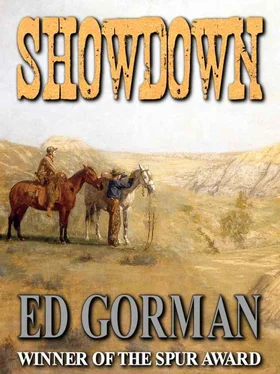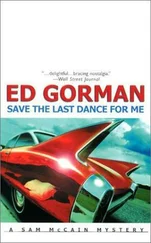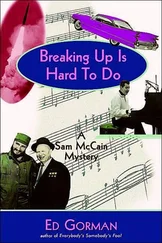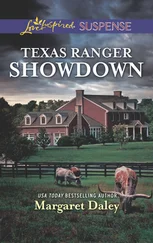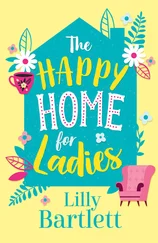Neville held the shotgun level with Prine's chest and then moved slowly around so that his back was to the house.
"I almost thought we were going to be friends someday," Neville said.
"Yeah. I like being friends with men who have their sisters murdered."
"There wasn't any pleasure in it for me, Prine. I did it because I had to. I wasn't particularly fond of her, but I didn't especially want to see her get killed." He shook his head. "Now, you're another matter. First thing you did when we got back to town was start to build a case against me. First damned thing. And I have to say that really pissed me off, Prine. It really did. So shooting you isn't going to be tough at all. Not at all."
He'd been so caught up in his own words, Neville, that he didn't see what was going on behind him.
Sheriff Daly rising from the dead, or something very much like it, and picking up his fallen Winchester and taking several tortured, half-stumbled steps so he'd be sure to be in range—
And then just blasting the shit out of Neville. Just blasting the shit right out of him.
Chapter Twenty-seven
You could barely get into Daly's tiny hospital room for all the good stuff people had brought him. You had flowers, you had several boxes of candy, you had enough magazines to give you cataracts, you had new shirts, new jeans, new boots, a new hairbrush, and on and on.
And you had Lucy.
She was in his room every chance she got. They had this odd sort of crush on each other, and Prine didn't care at all.
He'd sit there and watch Daly flirt with her and then watch her flirt right back. And all he'd do was smile.
All this passed, of course, in time.
Daly left the hospital—he still had bursitis and all the other itises, but his shooting arm was all right again, anyway—and Lucy and Prine got married, and Lucy in the middle of the night woke up one time and knew that she was with child. And Bob Carlyle retired from being deputy. And Daly decided it was time for him to retire, too, so Prine was made sheriff.
He needed the raise in pay. That October, Lucy got pregnant again.
A Special Preview of Murder in the Wings, part of the Jack Dwyer Mystery Series
Chapter 1
By the time we reached the second act the audience was well aware of what was going on. Stephen Wade, the television star who was playing the role of the father in this version of O'Neill's Long Day's Journey Into Night, was so drunk that he was knocking against furniture and quite often forgetting his lines. Between acts he had been given coffee and a quick walk in the cold, damp May night, but neither had seemed to help much.
I wasn't quite sure how to feel. Because this was the first really serious play I'd ever been in, and because my performance as the drunken elder brother, James Tyrone, Sr., depended so much on what Wade did, I was angry most of the time I was on stage. But then I'd look closely at Wade, at the matinee-idol good looks that had slipped into white hair and booze-loosened flesh, and I'd feel sorry for him. There was a grief in his blue eyes that overwhelmed me sometimes and I sensed a man destroyed and left empty.
Among the people at the Bridges Theater, staff and cast alike, there had been a lot of apprehension about how Wade, who had begun his career thirty years earlier in this same theater, would behave when he got here.
Well, for four weeks, he had done fine. From what anybody could tell, he stayed dry, his performances as impressive as anything we'd ever seen him do. On a couple of occasions he had asked Donna and me out to dinner, and we became friends of sorts. He always made her sad, his melancholy aura pulling her in, but he made her laugh, too. He was a great storyteller, and he'd known everybody important in Hollywood for the past twenty-five years. When the play finished its month-long run, I was going to take him fishing, up to a cabin a police officer friend of mine owned.
Then, he got drunk and came on stage that night and things changed.
A lot of it, I don't remember. I was aware of three things simultaneously—how awkwardly Wade was moving around the stage, how nervous I was that I was going to muff my own lines, and the steady undercurrent of whispers and snickers from the audience whenever Wade made a mistake.
Finally, it ended. The curtain came down and we all left the stage.
Michael Reeves, the director, was waiting in the wings. "Wade, I want to see you a minute." From the tremor in his voice, I could hear that Reeves was barely controlling his anger. He was six feet tall and muscular like a dancer. He might have been handsome if his swarthy face hadn't been so petulant. No matter what we did, he always seemed vaguely displeased. He never laughed except at somebody else's embarrassment.
When Reeves spoke, the whole cast stopped its quick flight to the dressing rooms. Much as Wade had embarrassed us, I sensed a protectiveness among the cast. Reeves was going to be very ugly.
Reeves came over and stood in front of Wade. "You realize you're fired."
Wade, still lost in a boozy haze, looked up and said, "I'm sorry about tonight. There's no excuse."
Reeves looked at the rest of us. "You see how he's going to try to get out of this? He's going to play the pathetic."
Wade, who was five-nine at best, tried to draw himself up with dignity, but he didn't have much luck. His shoulders slumped and his gut drooped. He was fifty-three years old and tapped out. He put out his hand for Michael to shake and said, "I embarrassed you tonight and I'm sorry." His voice quavered. I'd worked with enough alcoholics during my years on the force to know that Wade was very near the end. He probably needed hospitalization.
Reeves didn't take Wade's hand. Instead he slapped him.
Even above the noise the stagehands were making closing the theater down for the night, the slap sounded loud and harsh in the small theater.
"You sonofabitch!" Reeves screamed, letting his rage go. "This is an important play for me and you ruined it. Totally fucking ruined it!"
"Hey, Michael, down out a little, all right?" said Richard Keech, the actor who played Edmund. Keech had a suffering, almost pretty face wrapped in curly auburn hair.
"Yes, please, Michael. Let him go to his dressing room." This was Anne Stewart. Regal, slender, still a beauty at fifty, she played the mother with a quiet ferocity that had impressed us all.
"I don't think it's fair to pick on Michael. He isn't the one who's drunk." Evelyn Ashton, who played the maid, was twenty-four and ridiculously beautiful. Really. Since I'd met her I'd been playing a little game—trying to find a bad angle to her face. But there wasn't one. She had the gold silken hair of a storybook princess and gray eyes that were as luminous in their way as precious stones. Aerobics kept her body equally lovely. She had only one failing: she was obviously and painfully in love with Michael Reeves.
Now she started to slide her arm protectively around his waist, but Reeves pushed her away. He was trying hard to get control of himself. "I want you to take your things and get the fuck out of here tonight. Do you understand me?" He was yelling in Wade's face.
All Wade could do was stand there and take it. I glimpsed his eyes and wished I hadn't.
I was about to step in—I didn't like Reeves and maybe I was half using this as an excuse to finally have it out with him—when David and Sylvia Ashton appeared.
The Bridges Theater had been so named for one of the wealthiest men in the city, a man who'd made millions in steel when steel was building the country. His name was Hughton Bridges. Sylvia Ashton's mother, Leora, had had the good sense to marry the man. Sylvia, and consequently her husband David, were very wealthy. They spent their days running the theater.
Читать дальше
